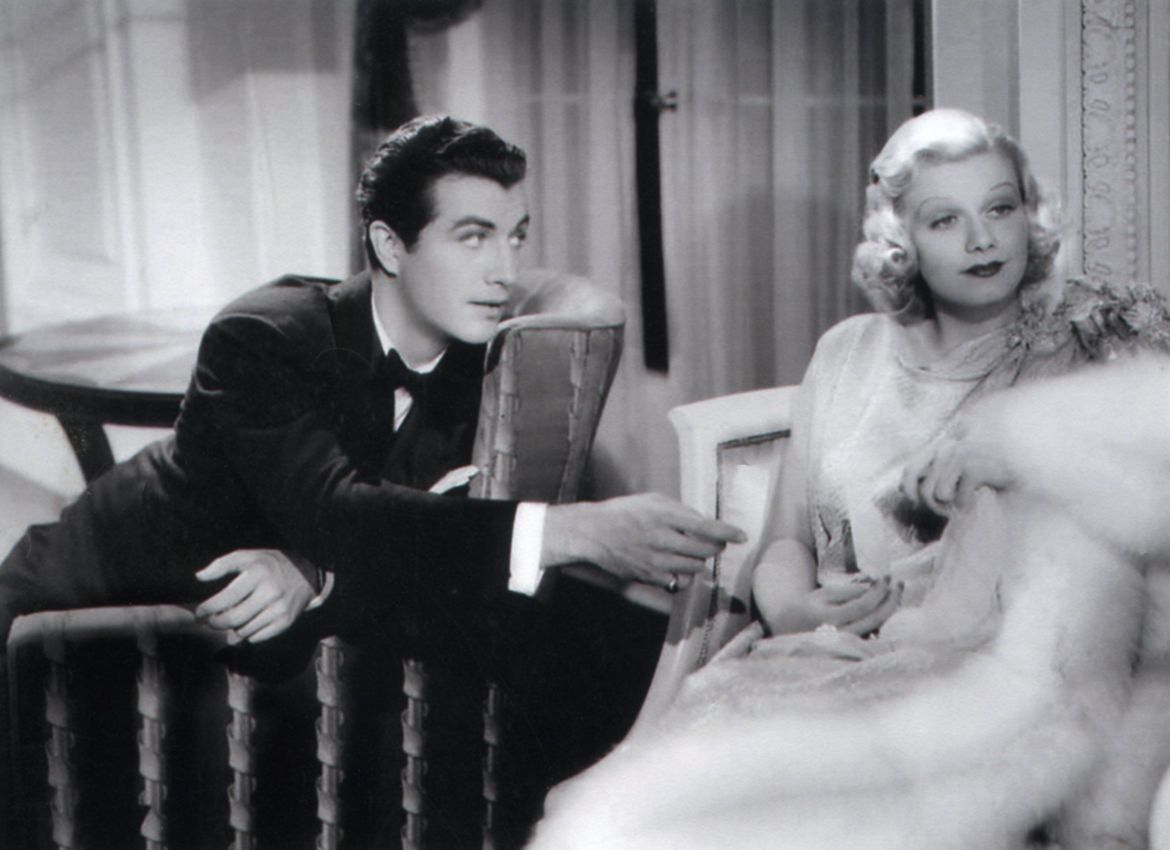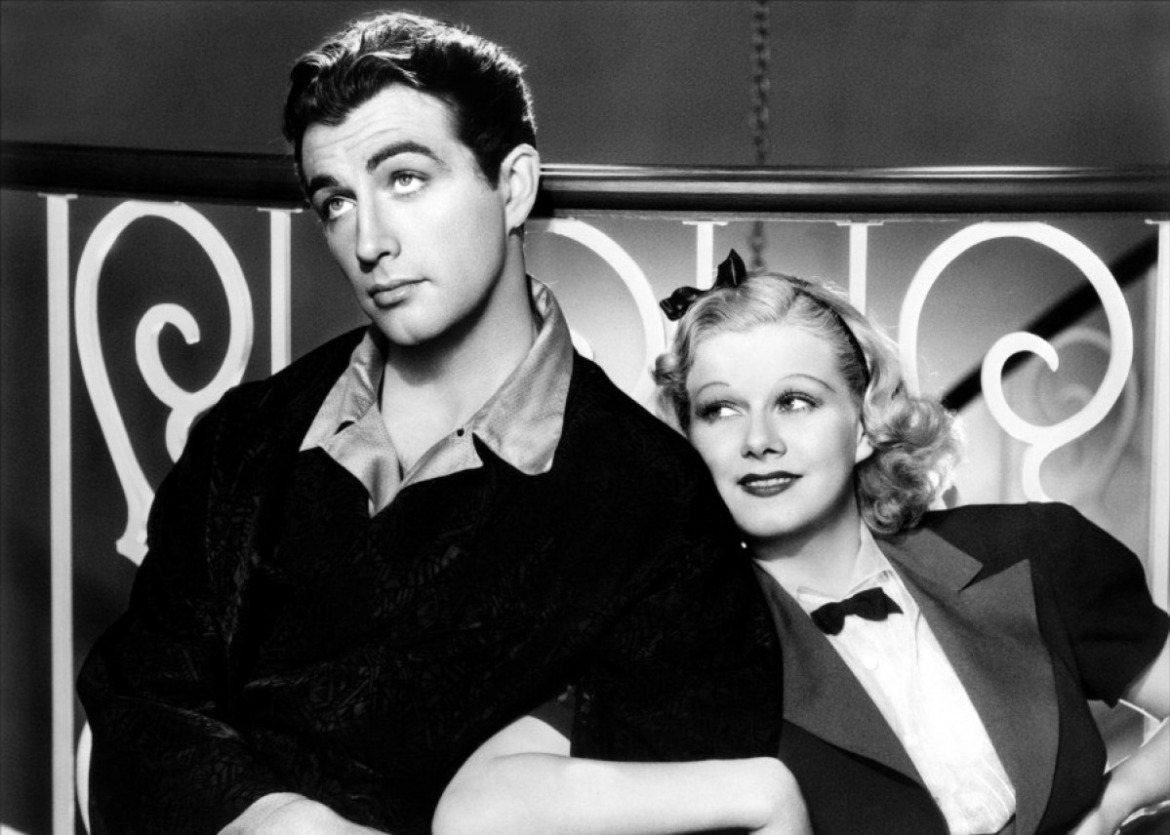Our examination of Jean Harlow’s career continues this week with her final fully completed film, Personal Property. The movie spotlights the legendary actress at the end of her career, facing not only uncertain health, but an equally uncertain future. At this point, the Production Code was hitting its stride, forcing the actress to drop much of her trademark sexuality. As such, Personal Property feels tentative, making it a tragically weak final (complete) entry into Harlow’s career.
Personal Property follows a wealthy n’er do well playboy (Robert Taylor) who bribes his way into a job guarding the personal property of a wealthy, but debt-ridden woman (Jean Harlow). The legendary W.S. Van Dyke directs the film from a script by Hugh Mills and Ernest Vajda.

Personal Property brings a narrative which really doesn’t age well, especially in the #MeToo era. While the story is believable as a romance when viewed through a Depression era lens, it feels creepy in today’s society. Raymond (Taylor) quickly gets his job guarding Crystal’s (Harlow) personal property after seeing her one time in a restaurant. He follows her to the opera and eventually back to her apartment. Stalker, much? Crystal knows this man is following her, but there is nothing she can do. In fact, it is the police who are making her shack up with this strange man she doesn’t know. If this wasn’t 1937, and he didn’t look like Robert Taylor, this could be the plot of a horror movie. This barely feels like a romance when the romantic desire is so completely one-sided; thus, forcing Harlow’s character into a passive role.
This film continues the trend of late thirties films which seem to struggle with Harlow’s screen persona. While her earlier films gave her an opportunity to either tackle comedy or even spread her wings dramatically, neither happens in Personal Property. As the film plays out, Harlow doesn’t seem in on the joke. Crystal is just… there. Her characters in the past (especially in her Pre-Code work) are incredibly active parts of the narrative. Often it is her story being told, allowing her to dictate the narrative. At the very least, she gets to take part in some of the comedy. However, in these later films (particularly this one), Harlow is forced into a secondary role. While she is billed first, this isn’t Harlow’s movie. From the opening frames, this is clearly a vehicle for Taylor. In fact, Harlow doesn’t enter the movie for almost 15 of the 80 minute film. Furthermore, even when she’s there, she’s not really in on the action. The comedy happens to her. The story happens around her. She’s very passive within the scope of the story.
Furthermore, this is another late Harlow film which tries to turn her into a society lady, while at the same time maintaining her typical star persona. Harlow absolutely shines in her early material, which lets her play a girl next door. She’s brassy and feisty, and it doesn’t feel right in the high society roles of her later career. Harlow fit as Crystal. Rather, the part would have fit someone like Myrna Loy, but this isn’t for Jean Harlow.

Personal Property features Harlow’s first (and only) pairing with Robert Taylor. The young actor was only a few years into his career, but his star rise quickly in the short time and he was on the fast road to stardom. Unfortunately, their chemistry is not as developed as some of Harlow’s other screen pairings. In fact, the relationship with Taylor’s character feels boring and forced on-screen. There is no sign of the heat in her work with Gable, the connection she had with William Powell, or even the sweetness of her relationship with Franchot Tone. Ultimately, Harlow’s teaming with Taylor doesn’t work, and it isn’t a surprise that this was the only time they appeared opposite each other.
Personal Property drills home the fact which has made itself clear in the later part of the actress’ career; her career was in transition. The implementation of the Production Code is the worst thing which could have happened to “The Blonde Bombshell”. The rigid morals of the period counteract the inherent nature of her star persona. The very thing the Hays Code didn’t want was a highly sexual beauty, who not only knows what she brings, but isn’t afraid to use it. As such, when Harlow is allowed to be her unfettered self during her string of Pre-Code successes, she shines. However, the changes brought about by the Production Code seem to truly effect her career. Had Harlow not passed away in 1937, it is difficult to imagine where her career would have gone from this point.
Stepping back, the supporting cast of Personal Property provides a tremendous amount to examine. While there are very few names which have transcended the decades (classic film fans may recognize actor E.E. Clive, who is best known for his recurring role in the popular Bulldog Drummond film series). Clive, combined with the rest of the cast, put forward highly crafted, almost over-the-top performances. While each are enjoyable, it gives the film a strange feel. This isn’t a slapstick comedy, so the presence of characters like a high society man who’s so upper-crust you can’t understabd his accent feels out of place in the structure of this movie. Each of these characters (while being a joy to watch) don’t feel like they belong in this movie. As such, it’s interesting to wonder what was the final product supposed to look like?
All in all, Personal Property is a less than stellar entry in Jean Harlow’s late filmography. The casting feels off, the story feels off, and the movie just seems to struggle. With a star whose career was fueled by craziness of the Pre-Code era, the more rigid nature of the Production Code forced Jean Harlow’s career into a turbulent transition. Had her illness not happened, how would her career have evolved?

Episode 61: The 2018 Citizen Dame Awards, Part 1 – Citizen Dame
[…] Kim’s Feminist Fridays continues to look at the films of Jean Harlow with China Seas and Personal Property […]